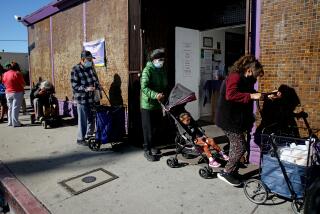Empower Communities to Stay Healthy
- Share via
The new grand design for Los Angeles County’s sprawling public health system reveals a refreshing readiness on the part of county officials to make watershed choices. Unfortunately, their proposals do not go far enough.
Many of the proposed changes, especially those that will create a decentralized system of public/private urgent care clinics, are long overdue. The county plan, however, does not provide dollars for neighborhood-based preventive health services, neighborhood-initiated health education and citizens’ involvement in planning their own health services.
The plan fails to consider that a highly skilled network of community-based health centers already is in place in many Los Angeles neighborhoods. For almost a decade, this network has been constructing a ground-up approach to health services. The county needs to financially support this approach.
Neighborhood-based preventive health care makes moral and financial sense in any comprehensive restructuring of the county’s public health system.
The Greater Hollywood Health Partnership provides a case in point. Under the auspices of the Queen of Angels-Hollywood Presbyterian Hospital, the partnership has been delivering “wellness” services to hard-to-reach immigrants, indigents, homeless and seniors at church sites since 1992.
Working through the outreach programs of Protestant, Catholic and Armenian Orthodox churches, the partnership offers health screening and referrals, nutrition education, blood pressure and cholesterol level testing, inoculations, tests for prostate cancer, breast cancer exams and prenatal education.
The partnership includes 20 member congregations, each of which has organized a health council to survey the medical needs of its immediate neighborhood. In cooperation with their sponsoring hospital and with other public and private agencies, the local health councils find resources to meet these needs.
The partnership’s model is an important supplement to the county’s long-term use of community health clinics. The model encourages a high level of community self-accountability and participation.
Neighbors work together. They find public and private resources to address problems that they themselves have identified. Their preventive medical services are offered in churches--institutions that are thoroughly integrated into the daily rhythm of city blocks. Their facilities require relatively low overhead. Their programs are supported by volunteers.
The greater Hollywood Health Partnership model is being replicated in South-Central Los Angeles, under the umbrella of the Southern Area Clergy Council. Working as the Health and Faith Coalition of Los Angeles County, both the Hollywood and South-Central organizations are taking steps to extend their model countywide, especially to areas that are heavily impacted by immigration and poverty.
These kinds of grass-roots organizations are both highly effective and highly vulnerable. They live off short-term grants from foundations and from public categorical programs. They are pilot projects that have worked, but they are still being funded in ways that cannot ensure their long-term survival.
Public health officials should find ways to include them in a restructured, balanced public health system. These programs would not undermine the county’s plan for an expanded network of public/private community health clinics.
The idea that public institutions should financially empower neighborhood-based human services, especially those associated with faith communities, is not new. The U.S. Department of Housing and Urban Development courts faith communities through such simple strategies as making clear that religion-related nonprofit corporations are eligible for a broad range of its grants. Secretary Henry Cisneros has established a Faith Community Initiatives Program, which provides information and consultation for religion-related nonprofits in their community development activities.
L.A. County health officers should make the same kind of connection and demonstrate their willingness to empower neighborhood-initiated programs.
More to Read
Sign up for Essential California
The most important California stories and recommendations in your inbox every morning.
You may occasionally receive promotional content from the Los Angeles Times.













